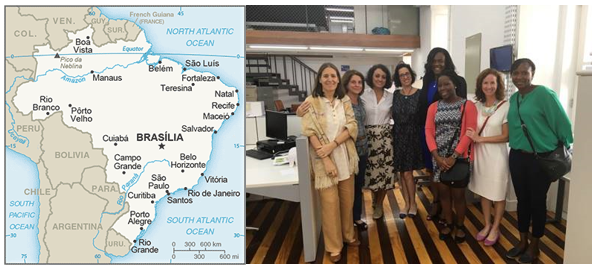Brazil: Acting on the Social Determinants of Health (2016-Current)
Highlights
Read a recap of the summer site visit.
Background
Rio de Janeiro, Brazil faces challenges similar to Baltimore city with significant racial ethnic disparities, income inequality, poor health system accessible to the poor, crime, inflation, and rising unemployment. Further similarities between Brazil and Baltimore were highlighted following the death of Freddie Gray, when Brazilians actively responded and participated in the Black Lives Matter Movement. In Brazil, police committed more than 1 in every 6 of Rio de Janeiro's homicides between 2010 and 2013 with 90 percent of individuals slain being of African descent. Brazil is a diverse country with a population that is 47.7 percent white, 43 percent mixed/mulatto, and 7.6 percent black, and — similar to Baltimore — individuals of color disproportionately carry the burden of adverse health and social outcomes.
For the past 25 years, disadvantaged social groups in Brazil have benefited from Saúde Criança (SC), a social organization that has been recognized internationally for its innovative and impactful work, as demonstrated in this video.
SC began in Rio de Janeiro and their methodology has been replicated in 31 countries in Latin America, Africa, and Asia. They use as holistic, co-responsibility model to address the Social Determinants of Health (SDOH) for families of children with chronic diseases. The SC program focuses on building family capacity and developing a family action plan that leverages unique family strengths and relationships. They work with clients to develop goals and objectives for addressing five key areas of the SDOH:
- Health (coordination of healthcare, psychological support, food, medicine, and nutrition)
- Income generation (professionalism training and access to eligible income resources)
- Housing (parent and child)
- Education (parent and child)
- Global citizenship (provisions of document necessary to be included in society and legal factors)
With improved access to necessary social resources, the families’ social networks are strengthened and families experience the benefits of increased social inclusion in their communities and society. Overall, the SC program has assisted over 70,000 families with an average of 600 families per year. It has demonstrated that sustainable positive health outcomes can be achieved by:
- breaking down barriers to social inclusion by providing resources to address the SDOH
- enhancing linkages to available health and social services
- empowering families with long-term, self-sustaining strategies to address social isolation and the SDOH.
Collaborative Goals
Since May 2016, the Office of Global Health has been working in partnership with the SA team to examine steps for culturally adapting their successful Brazil-based program model to the local context in Maryland. Our partners share the belief that this important endeavour to identify, prioritize, and eliminate the barriers to addressing the SDOH using a co-responsibility framework has the potential to influence the health of African-American families in Baltimore. SC and UMSON, with local stakeholders and mobilized community counterparts, will collaborate during the pre-implementation, implementation, and post-implementation phases of a feasibility study, which include activities to modify existing program components and develop appropriate evaluation tools for a Baltimore-based program. This model innovated in the Global South offers a fresh evidence-based approach and key lessons to empower communities in the Global North who are also experiencing disproportionate health disparities and encountering persistent health inequity and social injustices.
